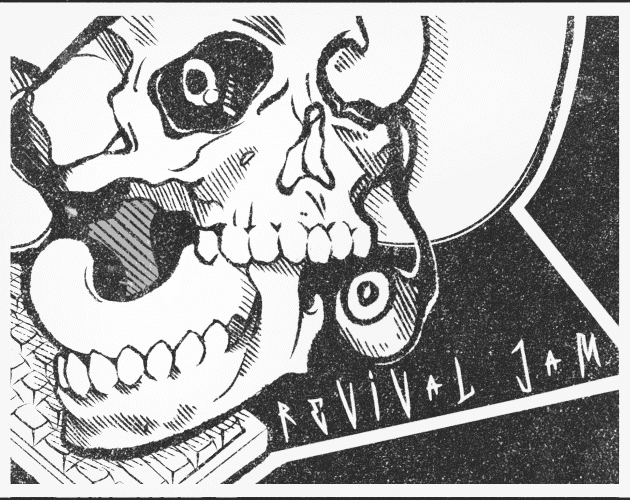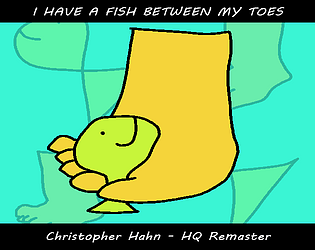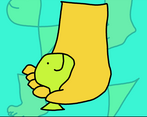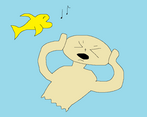I wasn't ready for the intense twist at track 9.
Play soundtrack
I Have a Fish Between My Toes's itch.io pageResults
| Criteria | Rank | Score* | Raw Score |
| 💖 Heart | #7 | 4.012 | 4.333 |
| ✨ Soul | #8 | 4.012 | 4.333 |
| 🧠 Mind | #13 | 3.240 | 3.500 |
| Overall | #15 | 3.510 | 3.792 |
| 💀 Body | #21 | 2.777 | 3.000 |
Ranked from 6 ratings. Score is adjusted from raw score by the median number of ratings per game in the jam.
What did you revive?
A lost music album from my childhood 🙌
Did you use any modifiers? If so which?
Early to bed, late to rise - Worked on this on the last day 👏
What was your goal? Did you succeed? Any noteworthy lessons?
Goal - To recreate the "joyous" songs from my childhood that I made in order to help "inspire" people losing at a party game to do better 👌.
Success? - Absolutely 👍
Lessons - I need a better mic that isn't part of my headphones 😅
Who all worked on your submission?
Christopher Hahn - @stormyman
Did you use any noteworthy assets in your project? If so what?
Everything shown, read, and heard are original creations 💖
Comments
I can't tell if I actually like this project or if I just have developed stockholm syndrome from listening to all the 13 tracks. I do very much enjoy the story progression of, what appears to be (at first glance) a very simple story, but it has a surprising amount of story, depth, layers, and meanings that comes from listening to all the tracks in the story very carefully. First and foremost: I don't believe that all the tracks are completely different characters (for some tracks it makes sense), but I believe there is a repeating story and theme taking place all throughout. Take tracks 2 - 4, for example. If we look at it through the lens we simply see 3 very different people experience something very similar to each other, who all feel very differently to another. The adventurer is upset at their new found situation and wants to remove the fish; the castaway sounds raspy and aged, as if the anger towards the fish has built up in time, and they wish to remove it too (albeit in a very different way to the adventurer); finally the Hiker has an outlook which completely opposes the other two, as they have now grown used to the fish and like it.
Separately, the story may be interesting, but quite it is disparate. However, by putting it all together and viewing it from the lens of one single character, you get a completely different, and much more interesting, perspective: The character starts out as an adventurer, but gets a "stinky" fish between their toe and must put their active life of adventuring behind them; moving on to a more mundane life (Now, this is where the most interesting parallel of the story starts: The Legend of Beowulf. Now, we will return to how this parallel affects and relates to the story in track #12, but for now just know that Beowulf is a mighty adventurer who had to quit their life of conquest after becoming old with age). Here the adventurer is not able to move on properly from their old life, neither physically or emotionally, and have become a castaway -- coping with no longer having the glamorous life they once had. The castaway's despair is shown through the hoarseness of the voice, and their attitude towards the fish, referring to it as "smelly" and "fatty" (notice how the fish retains similar qualities from the adventurer to the castaway, showing they are the same character). Then, in track #04 (the final track of what I believe to be the adventurer's current arc) they become a hiker; now content and happy with their simple life. Going place to place and viewing the world from a more humbled lens as they have now learned to live with the fish. This is shown through how the Hiker has now embraced the fish as a part of their life, shown in this line: "It (the fish) is going to help me find my way!"). We also know for a fact that the Castaway's fish were both shiny and bright and where one saw it as an obstacle, the other saw it as a tool. The repeating characteristics of the fish between all 3 of these seemingly 'separate' characters (as well as the clear arc and growth that happens between them), is what allows us to infer that they are all the same character (something which we will touch on towards the later end of the tracks).
The story really starts developing once we move past the adventurer, and really move from character based progression to one based around plot. It all starts from track #07, where the sheriff has had his deputy pass away from a fish between their toes (now, he uses the word 'knocked-out' but by him urgently going to see a Doctor (which we'll discuss more of, as it is fairly important to the plot) we can logically assume that the interaction was fatal, which would warrant him needing to see a Doctor in the first place). The Sheriff sees a doctor, who pronounces the disease as uncurbable (serving as foreshadowing that the disease is other-worldly as well, as we learn in track, #09). Everything up to this point has been carefully leading and building to this point of the story, as it's where all the pieces start to fit together, and the rising action begins. (Unfortunately, we must skip over tracks #05 and #06 as they more or less serve as an interlude to show time has passed since the Adventurer's story, and are less relevant to the overall plot).
First in track #09 we learn who the villain of the story is, a great other-worldly demon who has unleashed this 'plague' upon the world (we call it a plague since it's referred to as an 'uncurbable disease' by the Doctor, which as we went over is uncurbable because it's not of this world). Now, I'm going to quickly move past track #9, because it is quickly overshadowed in importance, by, quite possibly my favorite track: #10, The Hero, which server as a return of The Adventurer from the very first track (yes, the first track, since track #01 serves as a prologue to the story) and represents his call to action (Remember: this follows the Legend of Beowulf, again we'll get back to that soon). Here The (old) Adventurer picks up his sword again and declares himself as The Hero, which helps to show he was able to regain his confidence through his story arc. Now, this act of declaring yourself as a hero, would otherwise come across as egotistical or very cocky, but we do know that he's now humbled through the life he went through, so it comes a across more as a humorous play on himself, if anything (Note: as we will get into, The Dragon the adventurer will face, is symbolic of Death, meaning the hero knows this will be the last of his quests, which is why I believe he puts on a false show bravado, as Beowulf does when he is about to go on his last quest, also against a Dragon). Now track #11 is quite possibly the most complicated and in depth part of the story, so we will have to move past it unfortunately, but it is worth looking into discovering the nuances behind it. Tracks 12 and 13 represent the climax and falling action respectively, and gets into the more bitter-sweet ending of the story. Here, the story becomes more open-ended, but by following everything up-until this point and keeping in mind the stories themes and draws, we can fairly definitively infer what happens.
In track #12, titled I am the Dragon, we are introduced to the second villain of the story, who, in a fit of rage, goes to burn down the nearest town (now, as we touched on earlier, the Dragon represents Death and is the final enemy that Beowulf faces before his demise). Because we never hear from the following characters again (that being the Dragon, the Hero, and the Demon), I believe they all either meet their demise in this final track or go dormant in some way. The Hero, in one final valiant act of selflessness, comes and faces the Dragon, slaying it to protect the town where they once hailed from, -- but dying in the process and saving the lives of thousands more, making the ending bitter sweet. We can infer that the Demon's influence is limited to some extent; we know that he's very powerful, yet he can't interact with the world directly. Instead, he must interact with the world indirectly in order to exert influence over it, hence why he spreads a plague upon the world and uses dragon as a part of his plans instead of just blowing up the planet: because he doesn't exist in our realm. Following this, we can assume that by The Hero slaying the dragon, he has also thwarted the plans of the Demon as well, but we don't know for how long (again, this half-happy ending is portrayed through the death of the Hero).
Now, the reason why I believe all this happens within track #12, and is not simply pure speculation is because of the final track (and conclusion to the story), track #13, I am the Singer. Here the story is tied up very beautifully through an almost 'meta' lens, as it's where we learn we've actually been listening to the story from the perspective of an audience member listening to the story of the hero! This is so well done and a stroke of story-telling genius from multiple different perspectives. For one, it very well accurately represents how stories were shared and told in days of old! The idea that we are an actual audience member is confirmed in the final line of that track: "Thank you for coming to this show!", as it would be common to collect tips from the audience. Now, more importantly, what this does is tie together everything in the story. I believe in this world, the Hero has actually saved the day, and the singer is telling the true story of the Hero; how he started as an adventurer, lived a quiet life, and then returned again to save the world. In sharing the story, the singer is able to celebrate The Hero and commemorate his honor.
This confirms all the aspects of the story that we had previously assumed and inferred, and it does so in a very succinct manner: (1) The story follows a primary character - Specifically, the Adventurer, the Castaway, The Hiker, and The Hero are all the same person, that goes through a series of events, because if they were separate characters, they would not be mentioned in The Singer's story (Note: I do feel like I need to at least mention The Jester and The Game Developer (tracks #05 and #06 respectively), because I do not believe the Adventurer is either of those characters, they just serve as an interlude period The Adventurer's story) (2) The hero died valiantly - If the Hero hadn't died valiantly (instead choosing not to fight the dragon, for example) then they wouldn't be singing about his heroic death. (3) The Hero slayed the Dragon and thwarted the Demon's plans - If the hero hadn't stopped the Dragon, the town would be burned and no one would be left to sing in his honor of his accomplishments. If he hadn't thwarted the demon's plan, then the same would also be true; there would not be a cause to celebrate (4) The Demon may return - This is confirmed by them still having a fish between their toes, and furthers the bitter-sweet ending, as the world is saved, but at a cost; it's forever changed. This is where the story most deviates from that of Beowulf, as this presents a darker, more cynical ending.
Now this review is certainly not fully comprehensive, and I would encourage others to dig into the many nuances present in this story. Here I simply wanted to highlight the through lines of this story that I think is the most interesting and powerful; that being the story of the adventurer. Unfortunately, as mentioned, this means certain aspects were ignored and left unanswered. The Jester, The Game Developer, and the Fish may all be unrelated to The Adventurer's but what is theirs?
This is just what I have found: a single through line through an intricate web; one exit to a labyrinth with a thousand more. This may possibly be one of the greatest pieces of fiction ever created and I am excited to see what's next; if we see a continuation of the story unfold, what masterpiece would we see before our eyes? One where you look up from the piece and ask yourself, "Is it not beautiful?"
Thank you o great one 🙏
Your studiousness has been noticed by the resistance aiming to invade the demon fish lord's realm for the cure. Your beliefs have given them the courage to go with the strike 👏
Tid-bits of info that may help the contemporary listener
Track 1, the prologue, represents the average case of an infected person and how they would react.
Tracks 5 and 6, interlude 1, represent two extreme "unintended by the creator" cases of reaction to the infection. A case of extreme infatuation and a case of being only inconvenienced by the fish and being strong enough to work past the infection's other side effects.
Track 11 represents the second interlude, before the finale, that shows the perspective of what is like to be on the fish's end of this story.
Also, this particular fish said these loving words during its time with the persona of The Hiker.
Of course, I am just glad I was able to witness the birth of a modern day classic before my eyes. I appreciate this simple explanation of tracks 5 and 6, as, for the sake of focusing on the adventurer's story, I wasn't quite able to delve into their meanings, and I didn't want the uninitiated thinking they were completely irrelevant to the rest of the story (just that they aren't fully necessary to understanding the overarching plot). Though, in the case of track #11, a detail that even I didn't quite catch, is that the events of track #11 actually occur during the adventurer's time as as the Hiker. This alone adds an entirely new depth to the story, and ties in the idea that the fish itself is not evil, posing the interesting moral question of whether or not it's right to remove the fish at all. If we keep this detail in mind, we now know it was the fish who was able to change the adventurer's outlook on life: allowing him to regain his confidence and eventually become the hero who saves the town from the Dragon, and subsequently the world from the Demon. It also seems like the towns-people and the fish both have a common enemy, and, learning from the mighty adventurer, are going to unite and work together to fight the Demon, as you have teased a little here (though, this has the optimistic assumption that the towns-people are wise enough to do so, so I'm most interested to see what happens in this regard).
Keeping all this in mind, I'm very curious (and very excited!) to see how everything turns out in the next installment, notably how you're planning on tackling the moral-quandary of the fish (as we now know it's not simply a disease to 'cut-out', so to speak, or an enemy to rise up against, but, at potentially even, a way of life that can be embraced) and we will see how the towns-people are able to respond to such a situation. I am very much looking forward to what you have next! Best of luck, and I hope lightning (such as this) does indeed strike twice.
Okay, I love this. Can I use one of your songs for a singing bass plaque in my game? I laughed a lot. That game developer needs to deal with his fish-problem.






Leave a comment
Log in with itch.io to leave a comment.